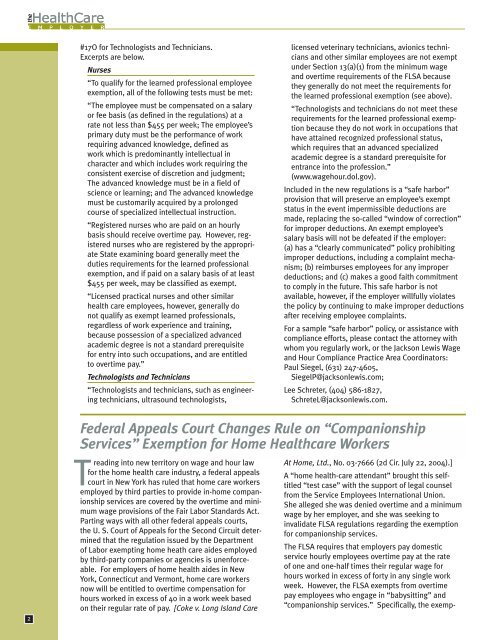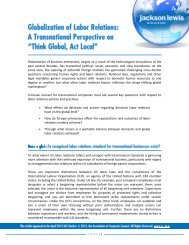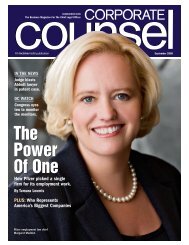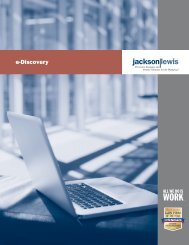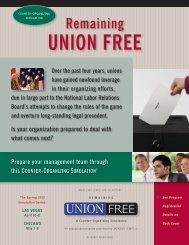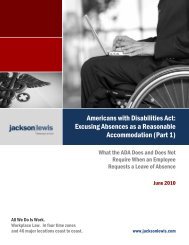Wage and Hour Compliance - Jackson Lewis
Wage and Hour Compliance - Jackson Lewis
Wage and Hour Compliance - Jackson Lewis
You also want an ePaper? Increase the reach of your titles
YUMPU automatically turns print PDFs into web optimized ePapers that Google loves.
#17O for Technologists <strong>and</strong> Technicians.<br />
Excerpts are below.<br />
Nurses<br />
“To qualify for the learned professional employee<br />
exemption, all of the following tests must be met:<br />
“The employee must be compensated on a salary<br />
or fee basis (as defined in the regulations) at a<br />
rate not less than $455 per week; The employee’s<br />
primary duty must be the performance of work<br />
requiring advanced knowledge, defined as<br />
work which is predominantly intellectual in<br />
character <strong>and</strong> which includes work requiring the<br />
consistent exercise of discretion <strong>and</strong> judgment;<br />
The advanced knowledge must be in a field of<br />
science or learning; <strong>and</strong> The advanced knowledge<br />
must be customarily acquired by a prolonged<br />
course of specialized intellectual instruction.<br />
“Registered nurses who are paid on an hourly<br />
basis should receive overtime pay. However, registered<br />
nurses who are registered by the appropriate<br />
State examining board generally meet the<br />
duties requirements for the learned professional<br />
exemption, <strong>and</strong> if paid on a salary basis of at least<br />
$455 per week, may be classified as exempt.<br />
“Licensed practical nurses <strong>and</strong> other similar<br />
health care employees, however, generally do<br />
not qualify as exempt learned professionals,<br />
regardless of work experience <strong>and</strong> training,<br />
because possession of a specialized advanced<br />
academic degree is not a st<strong>and</strong>ard prerequisite<br />
for entry into such occupations, <strong>and</strong> are entitled<br />
to overtime pay.”<br />
Technologists <strong>and</strong> Technicians<br />
“Technologists <strong>and</strong> technicians, such as engineering<br />
technicians, ultrasound technologists,<br />
licensed veterinary technicians, avionics technicians<br />
<strong>and</strong> other similar employees are not exempt<br />
under Section 13(a)(1) from the minimum wage<br />
<strong>and</strong> overtime requirements of the FLSA because<br />
they generally do not meet the requirements for<br />
the learned professional exemption (see above).<br />
“Technologists <strong>and</strong> technicians do not meet these<br />
requirements for the learned professional exemption<br />
because they do not work in occupations that<br />
have attained recognized professional status,<br />
which requires that an advanced specialized<br />
academic degree is a st<strong>and</strong>ard prerequisite for<br />
entrance into the profession.”<br />
(www.wagehour.dol.gov).<br />
Included in the new regulations is a “safe harbor”<br />
provision that will preserve an employee’s exempt<br />
status in the event impermissible deductions are<br />
made, replacing the so-called “window of correction”<br />
for improper deductions. An exempt employee’s<br />
salary basis will not be defeated if the employer:<br />
(a) has a “clearly communicated” policy prohibiting<br />
improper deductions, including a complaint mechanism;<br />
(b) reimburses employees for any improper<br />
deductions; <strong>and</strong> (c) makes a good faith commitment<br />
to comply in the future. This safe harbor is not<br />
available, however, if the employer willfully violates<br />
the policy by continuing to make improper deductions<br />
after receiving employee complaints.<br />
For a sample “safe harbor” policy, or assistance with<br />
compliance efforts, please contact the attorney with<br />
whom you regularly work, or the <strong>Jackson</strong> <strong>Lewis</strong> <strong>Wage</strong><br />
<strong>and</strong> <strong>Hour</strong> <strong>Compliance</strong> Practice Area Coordinators:<br />
Paul Siegel, (631) 247-4605,<br />
SiegelP@jacksonlewis.com;<br />
Lee Schreter, (404) 586-1827,<br />
SchreteL@jacksonlewis.com.<br />
2<br />
Federal Appeals Court Changes Rule on “Companionship<br />
Services” Exemption for Home Healthcare Workers<br />
T<br />
reading into new territory on wage <strong>and</strong> hour law<br />
for the home health care industry, a federal appeals<br />
court in New York has ruled that home care workers<br />
employed by third parties to provide in-home companionship<br />
services are covered by the overtime <strong>and</strong> minimum<br />
wage provisions of the Fair Labor St<strong>and</strong>ards Act.<br />
Parting ways with all other federal appeals courts,<br />
the U. S. Court of Appeals for the Second Circuit determined<br />
that the regulation issued by the Department<br />
of Labor exempting home heath care aides employed<br />
by third-party companies or agencies is unenforceable.<br />
For employers of home health aides in New<br />
York, Connecticut <strong>and</strong> Vermont, home care workers<br />
now will be entitled to overtime compensation for<br />
hours worked in excess of 40 in a work week based<br />
on their regular rate of pay. [Coke v. Long Isl<strong>and</strong> Care<br />
At Home, Ltd., No. 03-7666 (2d Cir. July 22, 2004).]<br />
A “home health-care attendant” brought this selftitled<br />
“test case” with the support of legal counsel<br />
from the Service Employees International Union.<br />
She alleged she was denied overtime <strong>and</strong> a minimum<br />
wage by her employer, <strong>and</strong> she was seeking to<br />
invalidate FLSA regulations regarding the exemption<br />
for companionship services.<br />
The FLSA requires that employers pay domestic<br />
service hourly employees overtime pay at the rate<br />
of one <strong>and</strong> one-half times their regular wage for<br />
hours worked in excess of forty in any single work<br />
week. However, the FLSA exempts from overtime<br />
pay employees who engage in “babysitting” <strong>and</strong><br />
“companionship services.” Specifically, the exemp-


